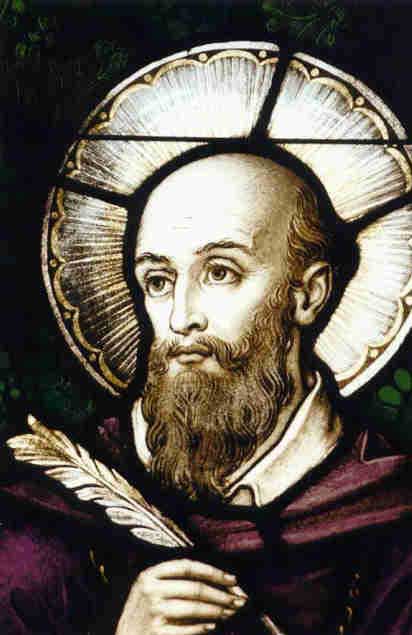Saint Francis de Sales Catholic Saint
CATHOLIC SAINTS 28-12-2023, 19:38

Saint Francis de Sales
Catholic Saint
st.Francis de Sales-Bishop of Geneva,
Doctor of the Church, founder and popular preacher
Also known as: the Gentle Christ of Geneva
Frances de Sales was born on August 21, 1567, to a noble Savoy family in Thorens in the duchy of Savoy. His parents were François de Sales de Boisy and Françoise de Sionnaz, and he was the oldest of five boys. He was brought up a strict Catholic and followed his father’s ambition for him to become a magistrate. Francis was well schooled at the colleges of La Roche and Annecy. From 1583 to 1588 he studied under the Jesuits at the college of Clermont, Paris. While there, he studied theology, which had a profound effect on him. He made a vow of chastity and consecrated himself to the Blessed Virgin Mary. He then went to law school at the University of Padua, Italy. He excelled in studies, was eloquent and gentlemanly and was well liked. In 1592 Francis received his doctorate of law and was appointed a lawyer before the senate of Chambéry, France. His father arranged for him to be appointed senator and to marry a noble heiress. But Francis refused, creating a serious rift with his father. Claude de Granier, bishop of Geneva, arranged for Francis to be appointed provost of the Chapter of Geneva, a position under the patronage of the pope. Francis’s father relented, and Francis received his holy orders in 1593. In Geneva, Francis threw himself with great energy into preaching and evangelizing.
In 1594 he began work in Le Chablais, a district just restored to the duchy of Savoy. He traveled extensively, sometimes at risk to his life, and converted many from Calvinism. Francis had several conferences with Theodore Beza, the “Patriarch of the Reformation,” but nothing came of them. In 1599, Claude de Granier appointed him coadjutor and sent him despite his refusal to Rome. There Pope Clement VIII (r. 1592–1605) approved of him, and prophesied that he would have a great impact upon the world. Francis returned to France and became friends with King Henry IV, who wished him to stay and preach in France. In 1602, de Granier died, and Francis was appointed bishop of Geneva. The next 20 years were the most productive of his life. He devoted himself to visiting the parishes, instituting reforms and religious instruction, and performing his ministerial duties. He did not care for the Calvinist influences in Geneva, and so worked primarily from Annecy, where he lived like a poor priest. His sermons were eloquent, and people loved to hear him preach. On at least one occasion he was witnessed illuminated by supernatural light as he preached. During this period, Francis found the time to write innumerable letters and treatises, many of which are still popular. In 1607, he founded the Institute of the Visitation of the Blessed Virgin Mary for young girls and widows. In 1622, Francis accompanied the court of Savoy to France.
In Lyons, he suffered a sudden apoplexy on December 27. He was given last rites and constantly repeated, “God’s will be done! Jesus, my God and my all!” He died the following day. Huge crowds came to see his body. Lyons wished to keep his remains, but kept only his heart, with everything else going back to Annecy. He was entombed at the Visitation Convent, and miracles were claimed there. During the French Revolution, nuns carried his heart to Venice for safety, where it still remains. His beatification in 1661 was the first beatification held at St. Peter’s Basilica. Francis’s heart was placed in a silver coffer. At intervals over the years, it exuded a clear oil, or manna. The coffer was not hermetically sealed, and in 1948 the dry heart was wrapped in a new piece of linen and a layer of tissue paper the same color as the heart. In 1952 white salt-like spots appeared between the heart and the container. The heart was unwrapped for examination, and the linen cloth had bloodstains. The heart was rewrapped in fresh linen and placed in a hermetically sealed container, which was then placed inside the original reliquary. In 1953 the heart was again examined, by doctors and Church officials.
No satisfactory explanation could be given for the bloodstains. One rather mystical explanation proposed that the heart had bled to express the saint’s unhappiness with a decision following World War II to reorganize the independent Visitation into a confederation under the jurisdiction of Rome. The confederation was eventually dissolved. In his sermons and writings, Francis showed a deep insight into human nature and psychology. He did not address himself to peers, as did many other great writers of the Church, but to the people. He was gifted in inspiring and motivating others to a higher spiritual life. Probably his best-known and loved work is Philothea, better known as An Introduction to the Devout Life, published in 1608. In a warm and personal fashion, the book lays out the requirements for a devout life of prayer, practicing virtues, resisting temptation, maintaining a good marriage, and worshiping God. Francis’s style translates easily for modern times, and Philothea remains a widely read and followed work. Another of Francis’s principal works is Controversies, which addresses the fundamentals of Catholic faith. It originally appeared in separate handbills and leaflets passed out to those whom Francis sought to evangelize in Le Chablais.
Other important works are: Treatise on the Love of God, a 12-book examination of the history and theory of Divine love; Spiritual Conferences, conversations on religious virtues, which Francis wrote for the Sisters of the Visitation; and Defense of the Standard of the Cross, a discussion of Catholic doctrine on the veneration of the cross. Francis wrote numerous sermons, especially for Lent also still popular reading and other treatises. Various religious congregations have been formed under his patronage, among them the Missionaries of St. Francis de Sales, of Annecy; the Salesians, founded by St. John Bosco in Turin for underprivileged boys; and the Oblates of St. Francis de Sales, of Troyes, France.

The Genealogy of Jesus Christ Matthew 1:16 HD-Wallpapers and Jacob the father of Joseph the husband of Mary,...
Learn more
Christmas Wishes Christmas is a box of tree ornaments HD wallpapers Download Christmas is a box of tree...
Learn more.jpg)
John 7:1-53 THE HOLY BIBLE The Gospel According to John Chapter 7:1-53 John 7:1 After this, Jesus moved...
Learn more


